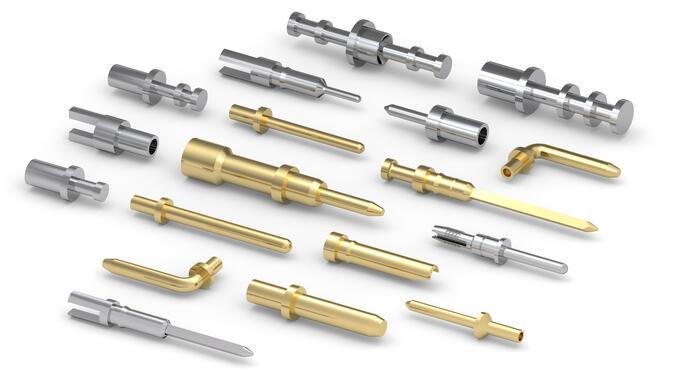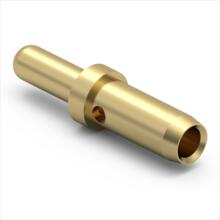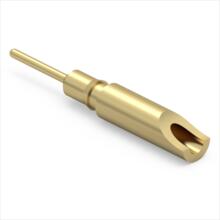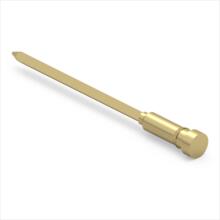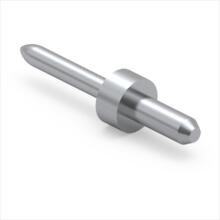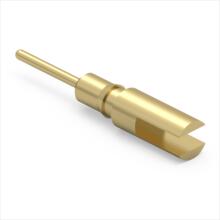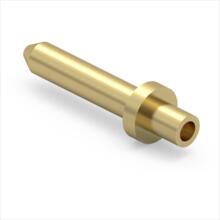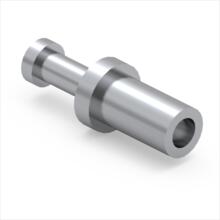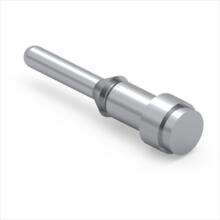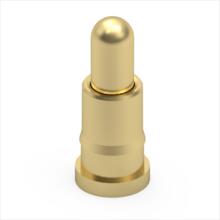Introduction to Printed Circuit Board PCB Pins
Mill-Max printed circuit board (PCB) pins are machined individual pins used for various plug-in applications and are functionally the dynamic building blocks within an interconnect system. Sometimes referred to as electronic pins or terminals these pins are precision machined and are often used to connect wires or components to electrical printed circuit boards.
PCB Pins are commonly fastened to printed circuit boards or other housings by being press-fit, swaged (riveted), crimped, or soldered. PCB pins serve not only as a conductive path for an electrical circuit but provide strength to an assembly module as a mechanical interface.
For wire mount applications, the terminal is firmly attached to the PCB, normally by soldering, riveting or swaging it through a hole in the PCB. The electrical wire is then physically attached and soldered to the pin. The terminal or lug is used for ease of assembly and provides a firm mechanical anchor for the wire (against mechanical strain, vibration, etc.) as well as a secure electrical connection, typically for larger diameter wires carrying higher currents. Typical uses are in high quality valve amplifiers, transformers, or test boards. Mill-Max Mfg. Corp. has developed thousands of state-of-the-art "basic pin" designs, featuring pin barrel geometries for our customers who require outside-the-box solutions to their interconnect needs. To find an electronic pin for your specific application, begin your search below using our product finder.
VARIOUS OPTIONS FOR PCB PINS AND TERMINALS
Whether your application requires through-hole mounting, surface mount, wire termination, press-fit or features for alignment, Mill-Max has multiple styles to choose from to ensure you find the right spring-loaded pin for your design.
Features of Mill-Max Precision Machined PCB Pin Connectors and Terminals:
- Precision high-speed turning of pins to tolerances of +/-.0005" for critical to function features
- Multi-Facet geometries for press-fit and surface mount applications
- Cost efficient brass alloy for production runs, other alloys available
- Seamless construction eliminates solder from entering the part
- Custom design options available in as little as 5 weeks.
CRIMP TERMINAL PINSCrimp terminal pins are discrete pins that are intended for wire termination applications that do not allow for soldering. They commonly accept a specific range of wire gauges and can be installed into connectors or engage directly with a Mill-Max receptacle. | |
SOLDER CUP TERMINAL PINSSolder cup terminal pins provide an alternative retention method for wire termination applications. Solder cup pins feature a drilled hole with a section of the hole exposed. This cutaway portion provides easy access during soldering and allows for a quality solder fillet. Solder cup pins are reliable for soldering wires and can be used in connectors or as discrete components. | |
WRAPOST (WIRE-WRAP) TERMINALS
Wrapost (Wire-Wrap) terminals are individual pins .025" or .045" square tail terminations that allow for wires to be wrapped around and soldered. These pins are commonly fastened to PC boards by being press-fit, swaged or soldered | |
SOLDER MOUNT PCB PINS AND SOLDER TERMINALSSolder mount PCB pins can be used across multiple applications and are commonly used for connecting multiple PC boards together. Solder mount pins are ideal for soldering to plated through holes and can generate either a permanent or pluggable solution with Mill-Max receptacles. | |
SLOTTED TERMINAL PINSSlotted terminal pins are ideal for soldering wires in a low-profile application; however, they can be used in a variety of different applications. Wires are placed in the slot and soldered in place. Slotted pins are commonly fastened to PC boards by means of swaging, soldering, or press-fitting. | |
SWAGE TERMINAL PINSSwage terminal pins offer an alternative method to mechanically fasten pin terminals to a PC board as opposed to soldering. Swaging captures the PC board between the shoulder of the pin and the swaged material, fastening the pin to the board like a rivet. | |
TURRET TERMINAL PINSTurret terminal pins consist of one or more circular shoulders around a center post for generating solder connections, wire wrap connections or even test points. Turret terminals are commonly fastened to PC boards through soldering, swaging, or press-fitting. | |
SURFACE MOUNT TERMINAL PINSSurface mount pins are ideal for SMT assembly and are intended to be soldered onto a pad on a PC board. Surface mount pins can also engage with Mill-Max receptacles for a pluggable board to board solution. | |
SPRING LOADED (POGO) PINSSpring-Loaded Pins provide an alternative but reliable solution for creating an electrical connection through its contact points. Spring loaded pins consist of 3 precision machined components and a spring to provide a range of vertical compression. In a spring-loaded pin application, the plunger is compressed against a mating component creating a surface pressure connection. Spring pins are available in alternative retention styles that include soldering, wire termination and press-fit to create spring loaded connectors. |
PCB Pin Application Specific Solutions
Mill-Max's specialization in high-speed turning technology allows custom shells to be machined in a fraction of the time required by processes using swaging or stamping dies and at considerably less cost. A custom interconnect can be easily realized by selecting one of the 35 pre-tooled contact types and having it press-fit into a custom machined shell. The inner contacts (clips) are made from precision stamped beryllium copper and are designed in a multi-tine (or "multi-finger") style enabling them to accommodate round, square and rectangular component leads, and will accept pin diameters ranging from .008" to .102", encompassing most design applications.
Stock materials and diameters available for custom manufacture include:
- BRASS Alloy: .062"/.072"/.078"/.093"/.125"/.156"/.187"/.250" diameters
- PHOSPHOR BRONZE Alloy 544 .062"/.072" diameters
- TELLURIUM COPPER Alloy 145 .079"/.093"/.125"/.156" diameters
Custom applications with low minimums are our specialty. Need technical help or looking for a custom design? Contact an Applications Engineer.

